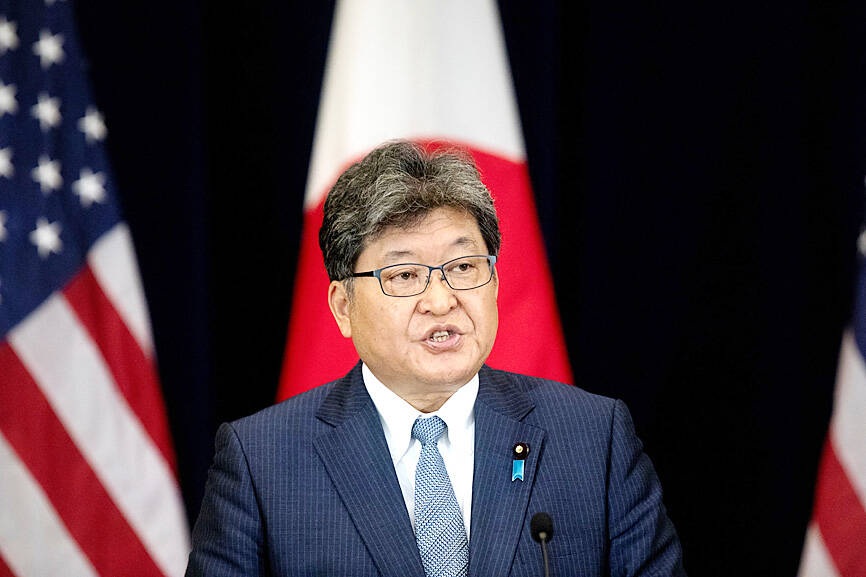President Tsai Ing-wen (蔡英文) pledged on Saturday to deepen security cooperation with Japan to ensure freedom in the Indo-Pacific, during a meeting with a senior member of Japan’s ruling Liberal Democratic Party (LDP).
Although Japan and Taiwan do not have formal diplomatic ties, they have close unofficial relations and share concerns about China, especially its increased military activities near them.
Meeting in the Presidential Office in Taipei, Tsai thanked Japanese Minister of Economy, Trade and Industry Koichi Hagiuda, the LDP’s Policy Research Council chairman, for Japan’s support over issues such as maintaining security in and near the Taiwan Strait.

Photo: Reuters
“We have seen in recent years Taiwan-Japan relations have become ever closer,” Tsai said.
“Taiwan will continue to deepen cooperation with Japan in various fields such as security, and work together to ensure the freedom, openness and stability of the Indo-Pacific region,” she said.
Hagiuda said Taiwan was a good friend to Japan and shares its values.
“Taiwan is an extremely important partner and a valued friend of Japan, with whom Japan shares fundamental values such as liberal democracy, basic human rights and the rule of law, as well as close economic relations and personal exchanges,” Hagiuda said.
“In this context, our help and cooperation with one another has built up over time,” he added.
Hagiuda is in Taipei to attend a forum today on Taiwan-Japan relations, and he told Tsai he would pay his respects at the grave of former president Lee Teng-hui (李登輝).
The Japan-educated Lee, who died two years ago, was dubbed “Mr Democracy” for ending autocratic rule in favor of pluralism.
Japan has expressed growing concern over China’s belligerence toward Taiwan as Beijing seeks to assert sovereignty over the nation.
China staged military drills near Taiwan in August to express anger toward a visit to Taipei by US House of Representatives Speaker Nancy Pelosi, including launching five missiles into the sea close to Okinawa, within Japan’s exclusive economic zone.

Chinese spouse and influencer Guan Guan’s (關關) residency permit has been revoked for repeatedly posting pro-China videos that threaten national security, the National Immigration Agency confirmed today. Guan Guan has said many controversial statements in her videos posted to Douyin (抖音), including “the red flag will soon be painted all over Taiwan” and “Taiwan is an inseparable part of China,” and expressing hope for expedited reunification. The agency last year received multiple reports alleging that Guan Guan had advocated for armed reunification. After verifying the reports, the agency last month issued a notice requiring her to appear and explain her actions. Guan

The Kaohsiung Tourism Bureau audited six hotels in an effort to prevent price gouging ahead of Korean band BTS’ concert tour in the city scheduled for Nov. 19, 21 and 22 this year. The bureau on Friday said that the audits — conducted in response to allegations of unfair pricing posted on social media — found no wrongdoing. These establishments included the local branches of Chateau de Chine, Hotel Nikko, My Humble House, and Grand Hai Lai, it said, adding that the Consumer Protection Commission would have penalized price gougers had the accusations been substantiated. The bureau said the Tourism Development Act

BACK TO WINTER: A strong continental cold air mass would move south on Tuesday next week, bringing colder temperatures to northern and central Taiwan A tropical depression east of the Philippines could soon be upgraded to be the first tropical storm of this year, the Central Weather Administration (CWA) said yesterday, adding that the next cold air mass is forecast to arrive on Monday next week. CWA forecaster Cheng Jie-ren (鄭傑仁) said the first tropical depression of this year is over waters east of the Philippines, about 1,867km southeast of Oluanpi (鵝鑾鼻), and could strengthen into Tropical Storm Nokaen by early today. The system is moving slowly from northwest to north, and is expected to remain east of the Philippines with little chance of affecting Taiwan,

The military yesterday said it has located the flight data recorder, or black box, of an F-16V jet that disappeared off eastern Taiwan earlier this month, and it would soon deploy a salvage team to try to retrieve it. Air Force Command Headquarters said that while it had pinned down the location of the black box, it was still searching for the aircraft’s sole pilot, air force Captain Hsin Po-yi (辛柏毅). Without providing details, the air force said it had located the black box days after detecting some intermittent signals and would now engage a team of professionals to retrieve it. The air